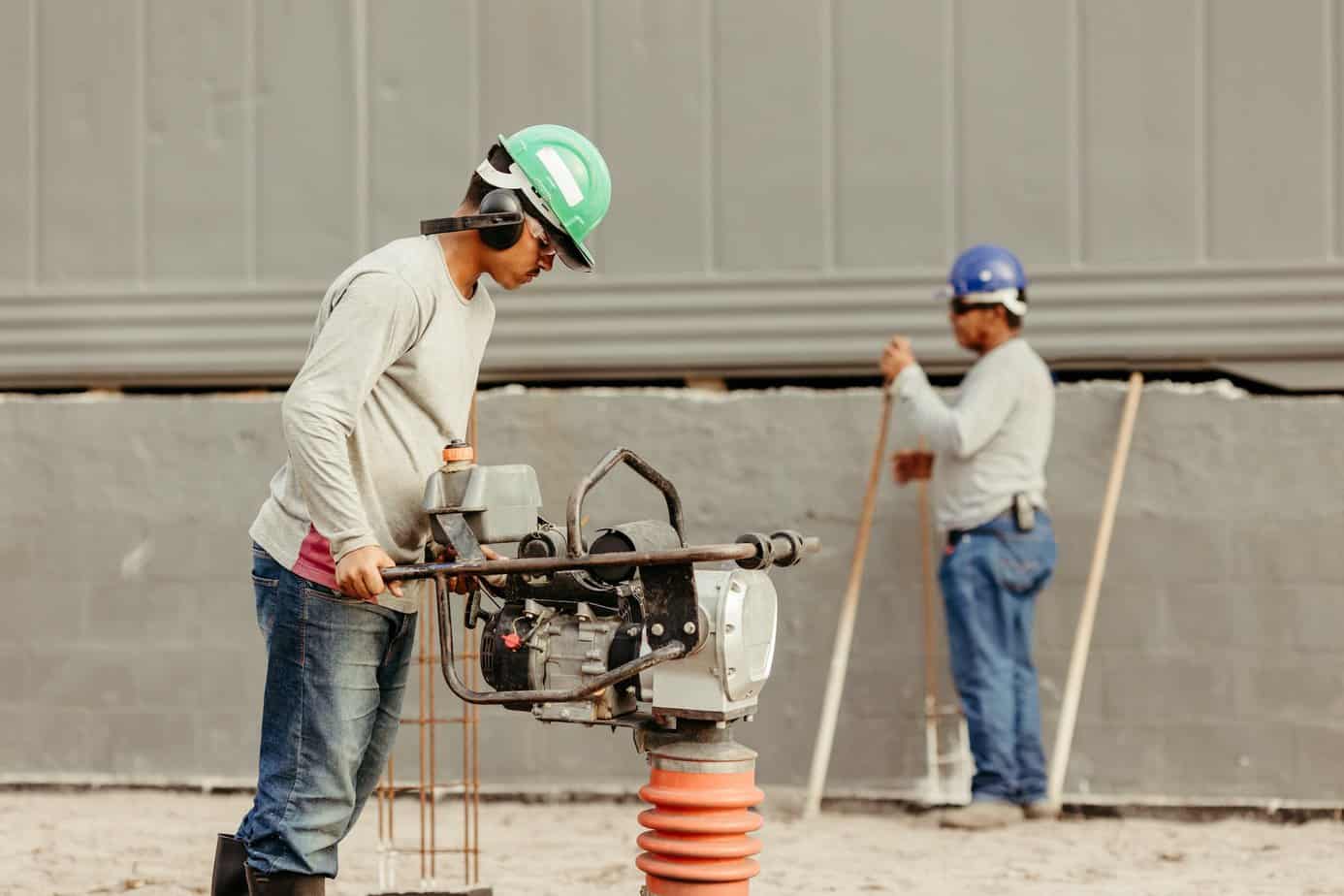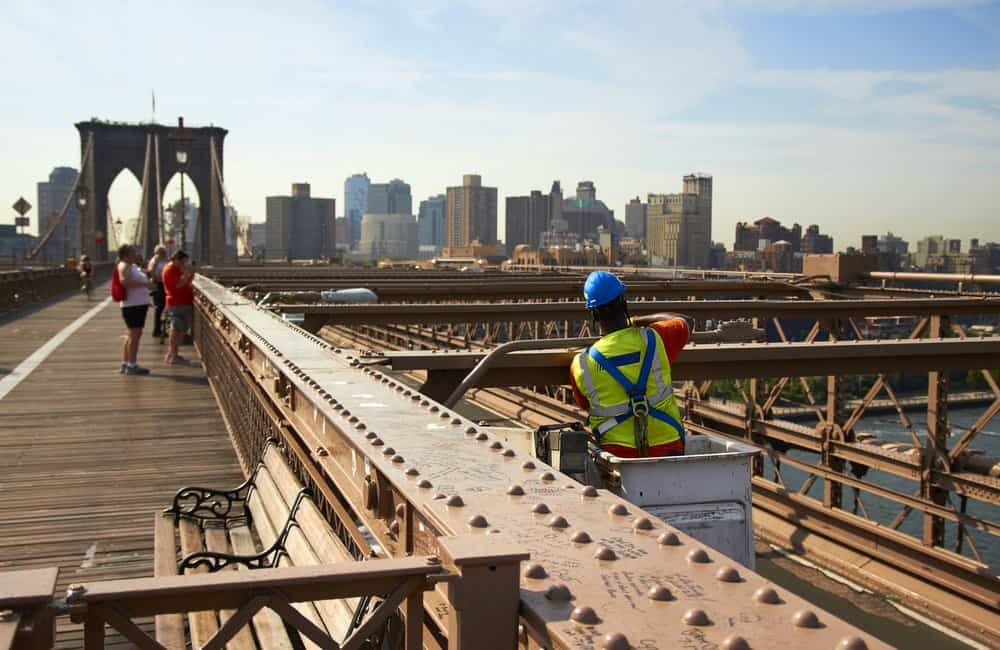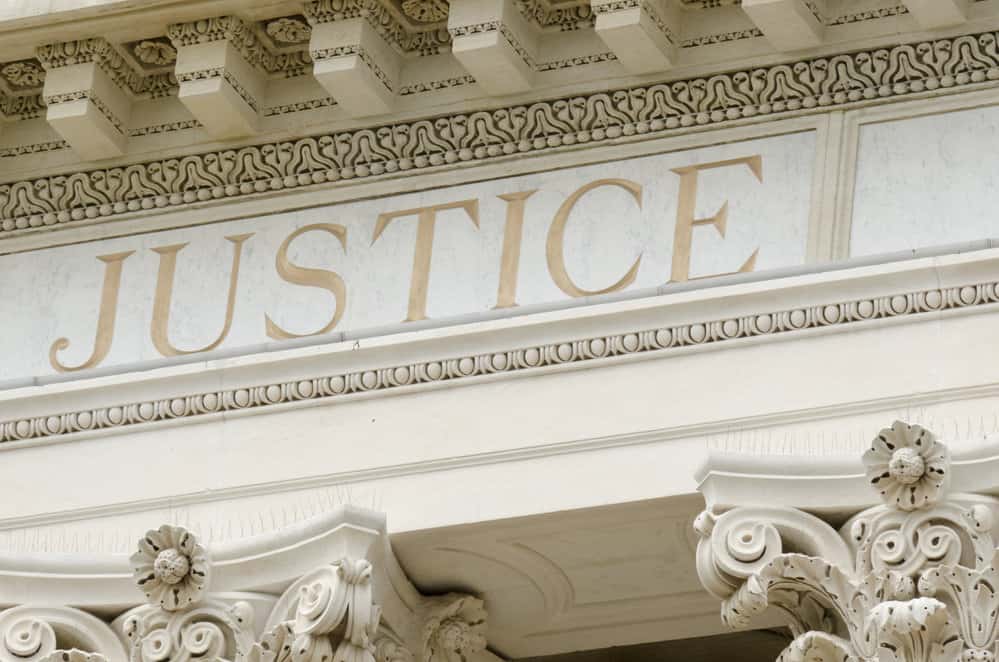Prevailing wage is a crucial aspect of the construction industry in New York, as it ensures that workers receive fair compensation on public works projects. In essence, the prevailing wage is the pay contractors and subcontractors in New York must pay their employees when working on public works sites. This rate is higher than the standard minimum wage, based on hourly rates paid by unions to specific workers in a given market.
The New York State Department of Labor issues prevailing wage schedules for general and residential construction projects on a county-by-county basis. General construction rates apply to buildings, heavy and highway, tunnel, and water and sewer work. Contractors and subcontractors must adhere to these wage schedules to comply with state regulations.
Key Takeaways
- Prevailing wage is critical in the New York construction industry, ensuring fair pay for workers on public works projects.
- The New York State Department of Labor establishes wage schedules for general and residential construction on a county-by-county basis.
- Contractors and subcontractors must adhere to these prevailing wage schedules to maintain compliance with state regulations.
Understanding Prevailing Wage
Article 8
In New York State, the prevailing hourly wage and usual benefits and overtime are paid to most workers, laborers, and mechanics within a given area. New York’s prevailing wage law is regulated under Article 8, which focuses on public construction projects. Prevailing wages are usually equivalent to the union wage. They can vary by location, as they are determined based on the average wages earned by professionals in similar roles in the area.
Article 8 of the New York State Labor Law ensures that contractors and subcontractors on public works projects pay their employees the appropriate prevailing wage, as established by the Department of Labor (DOL). These requirements apply to all parties involved in a public work contract, regardless of whether they have a direct contractual relationship with the public entity.

Public Work
Public work refers to any construction, maintenance, or improvement project funded and executed by a public entity, such as federal, state, or local government. These projects typically include building and renovating schools, hospitals, transportation infrastructure, and other public facilities. Regarding prevailing wages, contractors and subcontractors must know the specific rates applicable to their work locality and trade.
The New York State Department of Labor issues prevailing wage schedules for “General Construction Projects” and “Residential Construction Projects” on a county-by-county basis. General construction rates apply to buildings, heavy and highway construction, tunnels, water, and sewer. Employers with government contracts or foreign workers must pay their employees the prevailing wages to comply with the law and ensure fair compensation for their labor.
Understanding prevailing wage laws in New York, specifically under Article 8 and public work projects, is essential for contractors, subcontractors, and employees. Compliance with these laws protects workers’ rights and helps maintain a fair and competitive labor market.
Prevailing Wage Schedules
Wage Rates
Prevailing Wage Schedules are issued separately for “General Construction Projects” and “Residential Construction Projects” on a county-by-county basis in New York. General Construction Rates apply to projects such as Buildings, Heavy & Highway, Tunnel, and Water & Sewer rates. Prevailing wage is the wage and benefit rate set annually by the New York City Comptroller for each trade or occupation for employers performing public works projects and building service work on New York City government-funded work sites.
The Labor Law requires public work contractors and subcontractors to pay a service employee under a contract for building service work for a public agency a wage of not less than the prevailing wage and supplements (fringe benefits) in the locality for the craft, trade, or occupation of the service employee.
Benefits
In addition to the basic hourly cash pay rate, prevailing wage schedules include supplements (fringe benefits) that vary based on the craft, trade, or occupation. These benefits may include health insurance, retirement plans, vacation days, and other similar perks. The basic hourly cash rate should be no less than the statutory minimum wage established by the locality.
To find the prevailing wage schedule for a specific project, the NYS Department of Labor website offers a search tool that allows users to locate the appropriate wage rates and benefits based on the project’s location and type.
Scope in the Construction Industry
Repair
In the construction industry of New York, prevailing wage laws play a significant role, particularly in repair projects. These laws apply to maintaining and repairing public property and facilities let by the state and all other public entities. Contractors and subcontractors must pay their workers the prevailing rates of wages and supplements, ensuring they receive fair compensation for their work. The prevailing wage rates are determined on a county-by-county basis and are updated regularly to reflect changes in the market and cost of living.
Compliance with these laws is crucial for contractors and subcontractors working on repair projects in New York. Failure to adhere to the prevailing wage laws can lead to penalties, legal action, and even disqualification from future public work projects.
Demolition
Similarly, prevailing wage laws also cover demolition projects in New York. When working on projects involving demolishing public property and facilities, contractors and subcontractors must adhere to the established prevailing wage rates and regulations. The scope of such projects can vary widely, from removing a single structure to clearing an entire site for new development.
Just as in the case of repair projects, compliance with prevailing wage laws in demolition projects is essential for contractors and subcontractors in New York. Monitoring and enforcing these laws ensures the protection and fair treatment of demolition workers and the overall integrity of the public works system.
In conclusion, the scope of prevailing wage laws in the construction industry of New York is broad, encompassing both repair and demolition projects. These laws protect workers and maintain the quality and fairness of public works projects throughout the state.
Obligations for Contractors and Subcontractors
Contract Requirements
In New York, prevailing wage laws dictate that contractors and subcontractors working on public works projects must adhere to certain obligations. These obligations primarily involve workers’ compensation, ensuring they receive the prevailing wage rate and fringe benefits associated with their roles.
The prevailing wage is higher than the regular minimum wage, as it considers the hourly rates that unions pay for specific types of workers in a given area. Contractors and subcontractors must pay these rates to laborers and mechanics when working on federally funded or assisted contracts worth over $2,000. Furthermore, they should cover the prevailing wage rate set for the locality where the work is performed.
Construction contractors in New York need to be aware of their responsibilities, not just for their employees but also for the employees of their subcontractors. According to Section 198 (e) of the state’s labor laws, contractors are liable for all claims on unpaid wages, benefits, and wage supplements for workers employed by their subcontractors.
Recent legislation has reinforced these obligations. In September 2021, New York Senate Bill S2766 was signed into law, which stipulates that contractors in the construction industry are jointly and severally liable for wages owed to employees of their subcontractors.
In summary, contractors and subcontractors must adhere to New York’s prevailing wage laws by ensuring their workers receive appropriate compensation in line with the prevailing wage rates and fringe benefits. This includes being vigilant of their obligations, liabilities, and the potential consequences for non-compliance.
Employee Rights and Protections
Minimum Wage
In New York, all workers, including those on public work projects, are entitled to minimum wage rates. The prevailing wage law sets specific rates for employees working on public work projects, which are often higher than the regular minimum wage rate. These wage rates are determined based on the hourly rates unions pay in the same market for specific worker types. Employers must pay the prevailing wage rate for the location of the project.
Overtime
Overtime regulations, where applicable, also protect employees in New York. Under the state’s labor laws, overtime pay is required when an employee works more than 40 hours in a workweek. However, some exceptions may apply based on the type of employee or industry. Employees need to understand their specific rights and eligibility for overtime pay.
New York’s labor laws also require employers to provide employee meal breaks, offer health insurance, and grant medical or other necessary leave of absence. Employers must display notices in the workplace to inform employees of their rights, including minimum wage and workers’ compensation laws. Additionally, these businesses must keep accurate records of all wages and hours worked by their staff members to ensure compliance with state regulations.
Bureau of Public Work Responsibilities
Investigating and Enforcing Prevailing Wages
The Bureau of Public Works holds significant responsibilities regarding prevailing wage enforcement in New York. One of its core duties is to investigate and enforce prevailing wage laws, ensuring that all workers involved in public work projects receive the proper wage rates and benefits mandated by law.
The prevailing wage, set by New York State Labor Law, comprises the rate of wages and supplements that contractors and subcontractors must pay to workers on public work projects. These rates are established for the specific locality where the work is performed. As a result, the Bureau of Public Works plays a vital role in maintaining fair wages and benefits for various occupations within the construction industry.
The Bureau of Public Works undertakes several key tasks to carry out its responsibilities. It monitors and enforces compliance with prevailing wage laws by investigating potential violations and addressing any discrepancies. This could involve:
- Examining payroll records, pay stubs, and wage notices of contractors and subcontractors
- Interviewing workers to gather information and ensure compliance
- Imposing penalties and sanctions on employers found to be in violation
The investigation process may lead to changes in wage rates, supplements, and classifications, ensuring that all workers on public work projects are compensated fairly. It is important to note that the Bureau of Public Work’s responsibilities may evolve to address any new developments or amendments to New York State Labor Law. By maintaining a current understanding of the law and its ramifications, the Bureau can effectively carry out its mission to support workers and maintain a just working environment.
Posting and Recordkeeping Requirements
Regarding prevailing wage regulations in New York, contractors must adhere to specific posting and recordkeeping requirements. These guidelines ensure that employees receive the appropriate pay rate and are informed of their rights under the prevailing wage law.
Providing Prevailing Wage Posters
Contractors must prominently display the prevailing wage rate schedule, public work poster, Fair Play Act poster, and unemployment insurance poster on all public work projects. The contractor is responsible for ensuring these posters are easily accessible and visible to all employees. This not only helps in keeping workers informed but also promotes compliance with legal requirements.
In addition to posting these posters, contractors should always maintain accurate and up-to-date records of their employee’s wages, hours worked, and the prevailing wage rates applicable to their job classifications. Employers must provide written notice of the applicable wage rates, overtime rates, and basis of pay (hourly, shift, daily, weekly, salary, piece, etc.) at the time of hiring, in English and the primary language of the employee, as specified under New York Labor Law § 195.
Recordkeeping is critical to ensuring compliance with prevailing wage laws in New York. Proper documentation of employee wages and hours worked helps contractors adhere to the law and assists in any necessary investigations or audits conducted by the Department of Labor. While the posting and recordkeeping requirements may seem extensive, complying with these guidelines is essential to fulfilling the obligations associated with prevailing wage regulations in New York.
Determining Project Size and Applicability
In New York, the prevailing wage law applies to public construction projects, ensuring that construction workers are paid at hourly rates significantly higher than the minimum wage. To determine whether a specific project falls under the scope of this law, a three-prong test is applied, as mentioned by the Department of Labor.
First, the project must be classified as public work. This classification involves construction, reconstruction, maintenance, and other activities financed by public funds. Contracts for public works projects are typically signed between contractors and public agencies, such as the state, county, or municipality.
The size of the project also comes into play when determining whether prevailing wage rates are applicable. Although specific project size thresholds may vary, the larger the project, the more stringent the requirements for compliance with prevailing wage laws. This ensures that large-scale public works projects provide adequate compensation to workers in line with industry standards.
Various industries within the construction sector are affected by New York’s prevailing wage law. These industries are categorized into general construction, residential construction, heavy and highway construction, tunnel work, and water and sewer projects. Depending on the industry, prevailing wage schedules are issued county by county.
In summary, determining the applicability of New York’s prevailing wage law for a particular project involves assessing its status as public work, its size, and the specific construction industry it belongs to. By adhering to these guidelines, workers and employers can ensure that fair wages are being paid, fostering a robust construction sector in the state.
Frequently Asked Questions
What are the prevailing wage rates for NY construction?
Prevailing wage rates in New York can vary depending on the trade and location. The rate is based on the hourly wages paid to union workers in the given market and tends to be higher than the regular minimum wage. To determine the prevailing wage rate for specific construction trades in New York, you can look it up on the New York State Department of Labor’s website.
How to look up prevailing wages in New York?
To look up the prevailing wages in New York, visit the New York State Department of Labor’s website. On their website, you will find various resources and tools to help you determine the prevailing wage rates for different trades and locations within the state.
Which forms are required for NYS prevailing wages?
To comply with the New York State prevailing wage laws, contractors must submit the necessary forms, which include payrolls and certified payroll reports. These forms help ensure that workers on New York public worksites are paid according to the prevailing wage rates.
How is prevailing wage determined?
The prevailing wage is determined by analyzing the hourly wage rates paid to union workers in a specific trade and location. This information is then used to establish a minimum wage rate contractors must pay workers on public worksites within that particular trade and location.
What are the prevailing wages for laborers in NYC?
To find the prevailing wages for laborers in New York City, refer to the New York City Comptroller’s Office. The Comptroller’s Bureau of Labor Law sets and enforces the prevailing wage rates for public work projects in NYC. The wage rates for laborers can vary depending on the trade, so checking the Comptroller’s website is the best way to determine the specific rates for laborers.
What is the prevailing wage for nurses in New York State?
While the prevailing wage primarily applies to workers on public worksites, such as construction trades, some healthcare professionals employed by government entities may be subject to prevailing wage laws. To determine the prevailing wage for nurses in New York State, visit the New York State Department of Labor’s website and use the resources available to look up the specific wage rates applying to the nursing profession.



